The 2024 Library Publishing Forum opened with a keynote address that looked back on LPC’s first 10 years. Katherine Skinner reflected on the formation of the community, its original goals, and what it has accomplished. For long-time community members, the talk was a trip down memory lane. For newer folks, it was a stellar orientation. It also fit beautifully with our 10th anniversary theme for the conference, but it wasn’t just an exercise in nostalgia. Instead, it provided grounding for the real conversation we wanted to have at the event: where we want to be 10 years in the future.
The process
Katherine asked attendees to start pondering this question, and there was a Google Doc and a flipchart set up near the registration table where attendees could jot down ideas throughout the conference. However, the main discussion happened at the closing plenary on day two. After some brief scene-setting, we had attendees break into table discussions based on the following prompt:
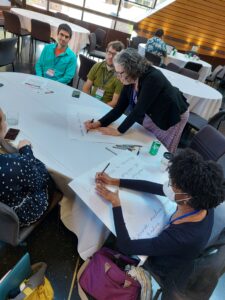 Where do we want to be in 10 years? You can answer the question at any level of specificity that inspires answers for you. Here are some specific prompts:
Where do we want to be in 10 years? You can answer the question at any level of specificity that inspires answers for you. Here are some specific prompts:
- What do you want your work life to be like in 10 years?
- Where do you want your publishing program to be in 10 years?
- Where do you want the field of library publishing to be in 10 years?
Each table took notes on flipchart pages, which allowed us to conclude the breakouts with a “gallery walk.” Once the attendees had had a chance to review the other groups’ notes, we reconvened for an open discussion on where we as a community want to be in 10 years.
The notes from this session were full of ideas, inspiration, and provocation, and will serve as a well that we can draw from over and over. This post is a synthesis of the major themes that rose to the surface, as I interpret them in the context of everything else happening in our community. It’s not the final word on the subject, but rather an opening salvo. I have identified three main themes, each with a vision for where we want to be, the challenges that currently stand in our way, and some possible approaches to move us towards our desired future.
Theme: Welcoming in and moving up
10-year vision: There is a wide pipeline into the field of library publishing, and library publishers are supported in moving into leadership positions.
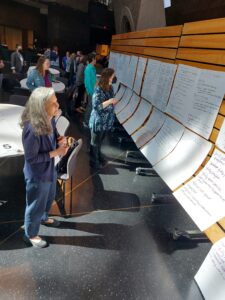 Current challenges:
Current challenges:
- Aside from a handful of elective scholarly communications courses in LIS programs, the opportunities for students and new professionals to develop library publishing skills and gain experience are dependent on local publishing programs and serendipity. This reliance on local connections and informal networks inevitably narrows the field and reproduces current racial and other inequities.
- There are no leadership development or mentorship programs that aim to move library publishers into positions of power. Ten years into the life of the Library Publishing Coalition, there are a handful of community members who have become library deans and more who have moved into middle management positions, but there are no structures in place to allow them to network or mentor future leaders in the profession.
Possible approaches:
- Connecting current LIS students to library publishing programs (especially those students at universities that do not have their own library publishing program). This could be done at the project level (as Katherine Skinner does in her library publishing class at San Jose State University) or more broadly through residencies, etc.
- Developing best practices for recruiting and supporting student employees in library publishing programs and providing networking and professional development opportunities. Publishing programs often employ undergraduates and non-LIS graduate students, and there should be clear pathways for them to pursue a career in the field.
- Sharing stories of transitions into leadership. This could be as simple as a webinar featuring library leaders with a library publishing background.
- Providing leadership development and mentorship opportunities for library publishing staff who are interested in moving into leadership positions.
Theme: Leading the way
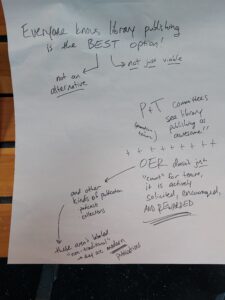 10-year vision: Library publishing is true to its values, is seen as a leader in the space, and is continuing to support the evolution of scholarship through experimentation and deep partnership. In other words, we have doubled down on the things we do well and are recognized for our strengths.
10-year vision: Library publishing is true to its values, is seen as a leader in the space, and is continuing to support the evolution of scholarship through experimentation and deep partnership. In other words, we have doubled down on the things we do well and are recognized for our strengths.
Current challenges:
- Even as interest in Diamond Open Access has grown, there is a lack of awareness of library publishing as a key player in the space.
- Lack of resources limits our ability to engage deeply with new technologies and understand both their potential and their risks.
- Lack of resources limits our ability to experiment with new forms of scholarship.
- The lack of diversity in our field (especially with regards to people of color) limits our imagination and makes it harder for us to fully live into our values.
Possible approaches:
- Engage in current discussions around Diamond OA (e.g., the Diamond OA Summit taking place this December in Cape Town) and promote library publishing as a sustainable model for ethical OA publishing.
- Engage in field-level advocacy efforts, including collaborative efforts with other aligned publishing communities (e.g., university presses, scholar-led presses, publishing programs in public libraries), to increase awareness of the unique benefits of library publishing.
- Explore new technologies at the community level, always bringing to bear a focus on ethics and harm reduction (e.g., explore how AI could improve PDF accessibility while being mindful not to use AI to replace current human-work).
- Continue to develop best practices for student publishing and to make explicit the connection between publishing and the educational mission of the university.
- Live into our values by doubling down on efforts to attract a diverse set of professionals to the field and to create a welcoming and supportive environment for them.
Theme: Building a Strong Foundation
10 year vision: Library publishing programs are well-staffed, adequately funded, and can count on continued support in the future. Staff enjoy sustainable workloads and supportive working conditions.
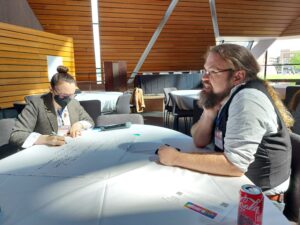 Current challenges:
Current challenges:
- Funding for publishing programs is often precarious, both because funding for libraries is precarious and because publishing can be seen as an add-on rather than a core service.
- Programs are often understaffed, creating unsustainable workloads and possible failure scenarios attached to staff turnover.
- Programs and staff are frequently isolated from peers, leading to reinvention of solutions and lower-quality work.
- There are no generally agreed-upon metrics for measuring the success of a library publishing program, let alone metrics grounded in our community values.
- We lack powerful, shared rhetoric to talk about the problems with the current system of scholarly communication and the work we are doing to make change.
Possible approaches:
- Advocacy: develop shared language and adopt shared strategies for promoting the value of library publishing.
- Impact: identify values-based metrics that can be used to gauge the success of a publishing program and support the use of those metrics by the community.
- Join forces to build political power: connect with aligned publishing communities to advocate for one another and for our shared values (e.g., University Based Publishing Futures).
- Join forces to increase resourcing: strengthen connections within and between libraries to make effective use of available resources, (e.g., collaborations between scholarly communications and collections units to increase funding for OA; regional and consortial efforts to host OA publishing software for member libraries).
Final thoughts
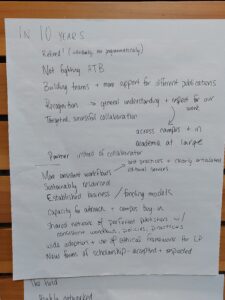 LPC recently released a Community Plan (PDF) that is the result of a deeply collaborative planning process that engaged the whole community over the span of a year. The plan lays out action priorities for LPC for the next 5 years, and it includes some significant areas of overlap with the vision laid out in this post (especially in the areas of advocacy and support for library publishers in a rapidly changing environment). That overlap is heartening, because while the plan is a concrete roadmap for action, the vision described in this post is our blue-sky view of the world we want to see in the future. Nothing in this post is binding on a strategy level, but it’s always useful to think about where we want to go. It’s also great to work backwards from that destination (as in the lists of possible approaches above) and find that the work described aligns meaningfully with the plans you have already made.
LPC recently released a Community Plan (PDF) that is the result of a deeply collaborative planning process that engaged the whole community over the span of a year. The plan lays out action priorities for LPC for the next 5 years, and it includes some significant areas of overlap with the vision laid out in this post (especially in the areas of advocacy and support for library publishers in a rapidly changing environment). That overlap is heartening, because while the plan is a concrete roadmap for action, the vision described in this post is our blue-sky view of the world we want to see in the future. Nothing in this post is binding on a strategy level, but it’s always useful to think about where we want to go. It’s also great to work backwards from that destination (as in the lists of possible approaches above) and find that the work described aligns meaningfully with the plans you have already made.
Finally, I want to emphasize that this vision is not limited to LPC. It captures a longing on the part of Forum attendees (who include LPC members, non-members, and friends) for a better world, and I hope that articulating it in this way will inspire other constellations of library publishers to consider undertaking the work it describes – or at least to articulate their own blue sky visions of the future and the steps needed to get there.
